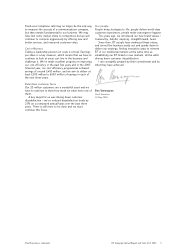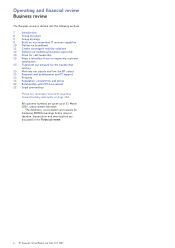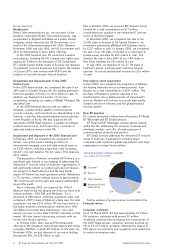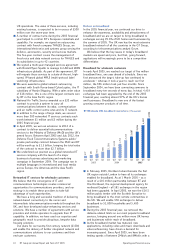BT 2005 Annual Report Download - page 16
Download and view the complete annual report
Please find page 16 of the 2005 BT annual report below. You can navigate through the pages in the report by either clicking on the pages listed below, or by using the keyword search tool below to find specific information within the annual report.The GCTO (Group Chief Technology Office) sets and
drives the innovation and technology strategy for BT.
GCTO includes a global technology intelligence scouting
unit, teams focused on innovative new wave service
opportunities, an innovation design and media team,
strategic technology analysis units, a network and systems
architecture team and world-class research and venturing
facilities in Adastral Park (England) and Malaysia.
The work undertaken by GCTO is part of BT’s £257
million investment in research and development in the
2005 financial year. This compares with £334 million and
£380 million invested in the 2004 and 2003 financial
years, respectively. We continue to focus our innovation
work on key areas which support our business and
technology strategies, filing 109 new patent applications
in the 2005 financial year and maintaining a total patent
portfolio of 7,400 patents and applications. Among the
awards won by our technology research team was the
British Computing Society’s IT Developer of the Year.
BT is a limited partner in the independent corporate
venturing partnership, NVP Brightstar, which generates
value by launching key innovations as new high-
technology businesses.
Property
At 31 March 2005, BT occupied approximately 6,600
properties, located principally in the UK. Most of this
property portfolio is owned by Telereal Group, a 50/50
joint venture between Land Securities Trillium and William
Pears Group.
The majority of these properties are specialised
operational buildings. They mainly house exchange
equipment and are needed as part of BT’s continuing
activities. Other, general purpose, properties consist
chiefly of offices, depots and computer centres.
Our property strategy is to continue to reduce costs, at
the same time as increasing usage and income
generation.
In the 2005 financial year, we sublet an additional
21,000sqm of office space, vacated 158,000sqm of space
ready for disposal and successfully disposed of Mondial
House in London for £51 million.
Regulation, competition and prices
The commercial environment in the UK and in the
countries in which BT operates is increasingly competitive
and dynamic. However, we remain subject to extensive
regulation, particularly in the UK, which can materially
affect the way in which we carry out our business. We also
use inputs, such as networks and services from other
regulated operators, largely outside the UK, and the
availability and price of these inputs may change from
time to time, which in turn affects our business.
Regulation in the UK
It is our policy to be fully compliant with the regulatory
framework in which we operate. During the 2005 financial
year, we continued to strengthen our compliance
activities and, in addition, we have worked closely with
compliance professionals in the telecommunications and
other regulated industries in the UK to establish best
practice. We have been in contact with European
telecommunications companies with the intention of
sharing ideas and best practice and bringing
improvements to the UK market. Our compliance policy
remains focused on ensuring that we continue to meet
the obligations imposed by, or under, the UK’s
Communications Act 2003 (the Communications Act) and
the Competition Act 1998 (the Competition Act) while
competing fairly and vigorously within the rules. We
publish an annual compliance report which can be found
in our social and environment report at www.bt.com/
betterworld
Ofcom
The UK regulatory environment changed materially in July
2003, when the Communications Act came into force,
bringing in a new regulator, the Office of Communications
(Ofcom), and a new regulatory framework for electronic
communications networks and services.
Ofcom was set up as a result of the increasing
convergence between telecommunications, broadcasting
and radio, to provide a single, seamless approach to
regulation across the whole converging marketplace. It
amalgamated the roles of five former regulatory agencies:
the Director General of Telecommunications (Oftel), the
Independent Television Commission, the Broadcasting
Standards Commission, the Radio Authority and the
Radiocommunications Agency.
Ofcom is headed by a board consisting of a chairman,
executive and non-executive members. Currently, the
chairman is Lord Currie and the chief executive is Stephen
Carter.
Ofcom has a wide range of general and specific duties
laid down in the Communications Act. Below is a
summary of those duties and functions of particular
relevance to BT’s activities:
&the principal duty to further the interests of citizens in
relation to communications matters and, secondly, to
further the interests of consumers, where appropriate,
by promoting competition. In doing so, Ofcom must
secure, among other things, the availability of a wide
range of electronic communications services in the UK;
&the duty to have regard to the principles under which
its regulatory activities should be transparent,
accountable, proportionate, consistent and
appropriately targeted;
&the duty to review regulatory burdens on a regular
basis and ensure that they do not involve the
imposition or maintenance of unnecessary burdens;
and
&the functions of setting conditions of entitlement (see
Regulatory conditions), and enforcing those
conditions (see Enforcement). Ofcom’s decisions are
subject to appeal on the merits (see Appeals).
In carrying out its duties, Ofcom must consider
promoting competition and the use of effective
self-regulation, encouraging investment and innovation,
and encouraging the availability and use of high-speed
data services (including broadband).
Regulatory conditions
Under the new framework, based on 2003 EU Directives,
providers may no longer be required to obtain licences
before offering telecommunications services. Individual
licences, such as that granted to BT in 1984, no longer
exist. Instead, there is a general authorisation for the
provision of electronic communications networks and
services.
Regulation is applied through separate sets of
conditions made by Ofcom, of which some apply to all
relevant communications providers. Others are imposed
Operating and financial review BT Group plc Annual Report and Form 20-F 2005 15
























